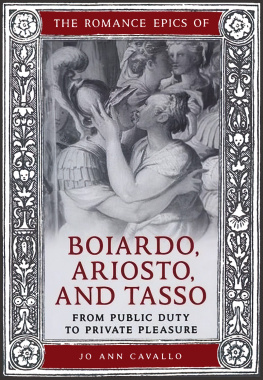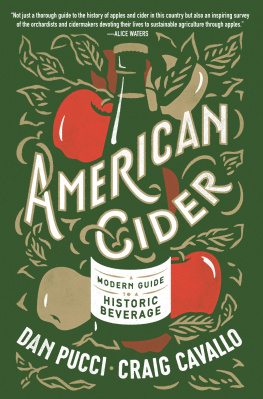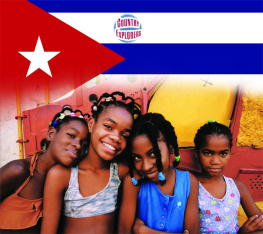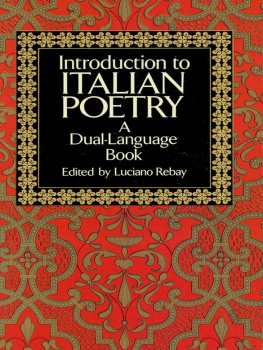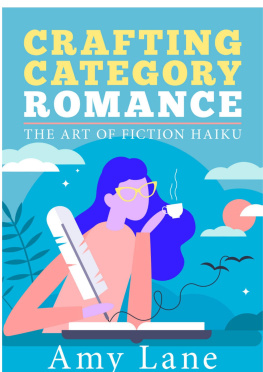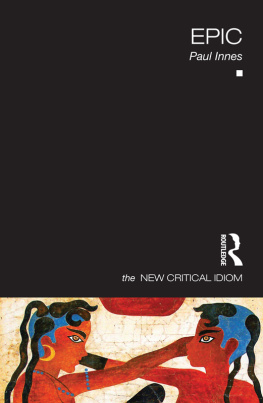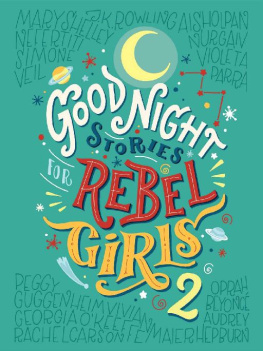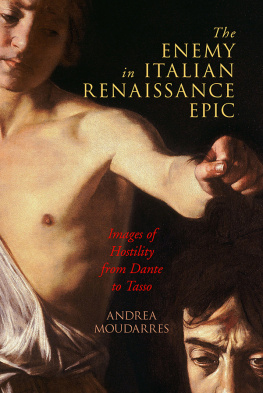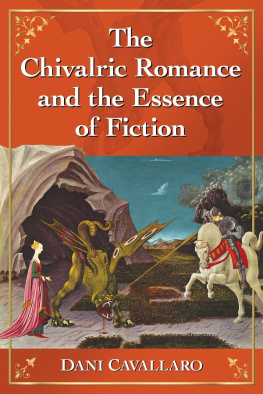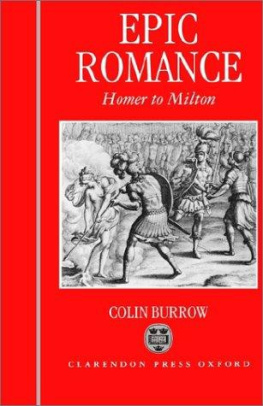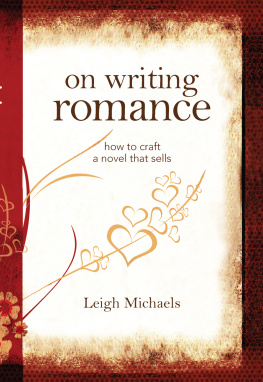JO ANN CAVALLO
The Romance Epics of
Boiardo, Ariosto, and Tasso
From Public Duty to Private Pleasure
UNIVERSITY ( TORONTO PRESS
Toronto Buffalo London
University of Toronto Press Incorporated 2004 Toronto Buffalo London
Printed in Canada
ISBN 0-8020-8915-1
Printed on acid-free paper
Toronto Italian Studies
National Library of Canada Cataloguing in Publication
Cavallo, Jo Ann
The romance epics of Boiardo, Ariosto, and Tasso : from pu lic duty to private pleasure / Jo Ann Cavallo.
(Toronto Italian studies)
Includes bibliographical references and index. ISBN 0-8020-8915-1
1. Boiardo, Matteo Maria, 1440 or 411494 Criticism and interpretation. 2. Ariosto, Lodovico, 14741533 Criticism and interpretation. 3. Tasso, Torquato, 15441595 Criticism and interpretation. 4. Epic poetry, Italian History and criticism. 5. Romances, Italian History and criticism. 6. Italian poetry 15th century History and criticism. 7. Italian poetry 16th century History and criticism. I. Title. II. Series.
PQ4117.C39 2004 851.03209 C2004-901406-4
University of Toronto Press acknowledges the financial assistance to its publishing program of the Canada Council for the Arts and the Ontario Arts Council.
University of Toronto Press acknowledges the financial support for its publishing activities of the Government of Canada through the Book Publishing Industry Development Program (BPIDP).
For my parents
Contents
Acknowledgments
An earlier version of chapter 2 was published in Italian as LOrlando Innamorato come speculum principis in Il Boiardo e il mondo Estense nel Quattrocento: Atti del convegno internazionale di studi, Scandiano-ModenaReggio Emilia-Ferrara, 13-17 settembre 1994, ed. Giuseppe Anceschi and Tma Matarrese (Padua: Antenore 1998), 1: 297-321. Sections of chapters 3 and 4 were presented at the American Association for Italian Studies 1997 conference and published as From Alexander to Hector: History and Epic in Boiardos Orlando Innamorato in Italian Culture 16.1 (1998): 11-26. Sections of chapters 6 and 7 were presented at the Philology and Criticism Seminar at the Italian Academy for Advanced Studies in America at Columbia University, February 1994. A condensed version of chapter 8 was presented as The Unraveling of the Civic Fabric: Ariostos Rewriting of Boiardos Justice Trilogy at the Renaissance Society of America Conference, College Park, Maryland, February 1998. Sections of chapters 14 and 15 have been developed from an earlier essay: Tassos Armida and the Victory of Romance in Renaissance Transactions: Ariosto and Tasso, ed. Valeria Finucci (Durham, NC: Duke University Press, 1999), 77-111. A shorter version of the same essay was presented in Italian as Armida: la funzione della donna-maga, at the Il Tasso e il mondo Estense conference in Ferrara, December 1995, and was published in the proceedings (Florence: Olschki, 1999), 99-114.
A much earlier draft of this book was circulated in 19967 as part of my tenure review process, and I would like to take this occasion to thank the anonymous external reviewers for their patience in reading that unpolished version. I would also like to thank my students for the feedback they have provided throughout the years in my courses on the romance epic in both New York and Scandiano, Italy Mirella and Carlo Galloni generously arranged for Luca Trascinelli to photograph the fresco detail shown on the book jacket; Prof. Francesco Barocelli, director of the Settore Musei-Pinacoteca Stuard of the Commune of Parma, graciously authorized its use.
Gillian Watts compiled the index.
Abbreviations
Aen. | Virgil, The Aeneid |
Am. | Bernardo Tasso, Amadigi |
AV | Boccaccio, Amorosa visione |
CC | Ariosto, Cinque canti |
Cort. | Castiglione, Il libro del Cortegiano |
Dec. | Boccaccio, Decameron |
GL | Torquato Tasso, Gerusalemme Liberata |
IL | Trissino, LItalia liberata da Goti |
Mam. | Cieco da Ferrara, ll Mambriano |
Met. | Ovid, The Metamorphoses |
OF | Ariosto, Orlando Furioso |
OI | Boiardo, Orlando Innamorato |
Rin. | Torquato Tasso, Rinaldo |
THE ROMANCE EPICS OF
BOIARDO, ARIOSTO, AND TASSO:
FROM PUBLIC DUTY TO PRIVATE PLEASURE
General Introduction
This book aims to understand the romance epics of Boiardo, Ariosto, and Tasso within their literary contexts, with a particular focus on questions of creative imitation, genre, allegory, ideology, and politics. As I trace certain key episodes and recurring patterns within these poems, I am thinking in terms of engagement, not indebtedness. Consequently, I am not interested in poetic rivalry or the anxiety of influence, but rather in how each successive poet creatively reworks significant aspects of his predecessors poems to give meaning to his own romance epic. I am concerned, moreover, with how these poets use genre not only romance and epic, but also historical, allegorical, and novelistic episodes to construct the ideological program of their respective poems.
In the course of this contextualized reading of the romance epics of Boiardo, Ariosto, and Tasso, I also discuss how some of the same thematic and narrative strands are reworked in less known poems by three of their contemporaries: Francesco Cieco da Ferrara, Giangiorgio Trissino, and Bernardo Tasso. By considering how each poet uses creative imitation to develop his ideas on literary, ethical, social, and political issues, I hope fo offer a fresh perspective on the romance epic in Italy during the century of its greatest development.
The literary context of these poems is inextricably linked to the historical context, and thus a secondary aim of this study is to explore how the romance epic, the principal narrative mode of the day, both reflected and reflected upon the world outside the text. Although all texts, to the degree in which they participate in any given socioeconomic grouping, are perforce political, I will not be arguing here for a passive or unconscious transmittal of hegemonic values, but rather a deliberate, albeit not always explicit, engagement with significant social and political questions of the period.
Boiardo
Matteo Maria Boiardo (1441-1494), grandson of the humanist Count Feltrino Boiardo, nephew of the poet Tito Vespasiano Strozzi, and cousin of the philosopher Giovanni Pico della Mirandola, most likely began composing his romance epic in the final years of Borsos reign. When Ercole I dEste (ruled 1471-1505) assumed the dukedom, Boiardo was listed as one of his close companions. In the preface to the various translations that Boiardo dedicated to Ercole he assumes the role of teacher, noting in Guarinian fashion that history teaches good government. In his romance epic, he infuses the adventures of his chivalric heroes with the civic ideology and classical scholarship of the humanists. He also provides his Este patrons with models of behaviour to emulate by designating the female paladin Bradamante and the ideal knight Ruggiero as progenitors of their family. Boiardos unfinished romance epic numbered 35,440 verses at the time of his death in 1494, the year of the French invasion that signalled the beginning of the end of political autonomy for the Italian states.

